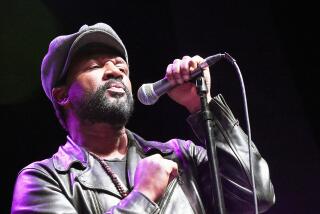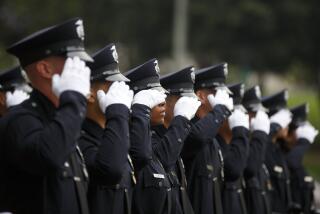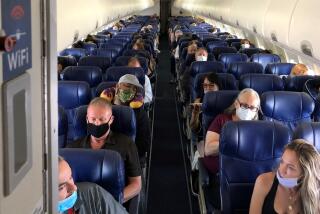Use Profiling Judiciously
- Share via
This week, profiling is under attack after a Secret Service officer was removed from a flight on Christmas day. With the possible exception of Afghan leader Hamid Karzai, American Airlines could not have picked a worse person for an incident. The officer was an Arab American on his way to join the security detail to protect President Bush. The Secret Service officer immediately became the vehicle for a full-court press by Arab American advocacy groups and civil libertarians, who have had some legitimate grievances with the security crackdown following the Sept. 11 attacks. However, with more than 40 million people traveling each month by air, profiling may not only be necessary but inevitable in the fight against terrorism.
In this incident, the accounts from the pilot and the agent could not be more different. To read the pilot’s account, he was faced with a “hostile” armed individual with suspiciously incomplete and unreadable paperwork. To read the agent’s account, he found himself confronted by a pilot who could not overcome the mental block of an armed Arab American on his airplane.
One of these accounts is likely to be borne out in a lawsuit announced Thursday by the agent’s lawyers. However, this incident may actually say little about profiling. We give authority to pilots to use their instinct and judgment as the final line of defense against terrorism. This pilot may have acted improperly or arbitrarily in reviewing the facts but he was correct in questioning the agent and demanding confirmation of his status.
There is well-based opposition to profiling. There has been abuse for years and profiling is prohibited in many states. Profiling has been used to isolate groups such as young African American males for legally permissible patdowns based on reasonable suspicion by police.
The suggested use of profiling in airports, however, is different. Where profiling of African Americans was based on a generalized suspicion of criminal intent, the profiling of some categories of Arab travelers is tied to a single defined crime and an established nexus between certain groups and the current threat. The suggestion that the questioning of Arab travelers is based on mere ethnic prejudice is absurd.
All 19 of the September hijackers were young Arab men. The vast majority of Al Qaeda members and Taliban fighters are Afghan or Arab men. All 22 people on the FBI’s most wanted terrorist list are Muslims and virtually all are Arab. This may have something to do with the fact that the cause for the hatred spawning this terrorism is centered in the Middle East and steeped in Islamic fanaticism.
The reluctance to use a profile at airports for terrorism seems designed to satisfy modern sensibilities at the cost of actual security. Terrorism at airports is different from other crimes in that it is sudden and terminal. Society can sustain some missed opportunities in the “war on drugs,” but a missed opportunity in the war on terrorism is measured in body counts.
A profile is merely a device used to identify potential criminal actors based on statistical and case analysis. These profiles may include nationality, physical description and other factors found to be common for a crime. Where courts have long given great weight to the “hunches” or instincts of experienced officers in making some stops, a profile merely compiles the experience of hundreds of officers into a diagnostic tool. When it comes to terrorism, the common denominators among past cases is strikingly consistent and predictive.
None of this means that all profiling is legitimate. It would be outrageous to use religion as a profile category despite the uniformity of the religion of these terrorists. Moreover, nationality or ethnicity should only be a factor and not the sole factor. If every Arab American is being stopped, stereotypes rather than statistics are controlling selection. The greatest injuries, however, are not found in the stop itself. We should focus our intention on the conduct of security staff after a stop is made.
There is nothing that runs against the American grain so much as a profile. This week, Transportation Secretary Norman Mineta likened profiling at airports to the internment of Japanese Americans in World War II because of their ethnicity.
We need to gain a degree of perspective if we are to resolve the issue of profiling. We are not talking about internments or arrests but stops at airports. While it is important to keep our history of racism in mind, we can be so blinded by our commitment to avoid our past abuses that we refuse to see the obvious dangers before us.
We would be better served as a nation if we stopped debating the clear value of some profiling and instead discuss the conditions and monitoring needed to ensure that it is not abused.
More to Read
Sign up for The Wild
We’ll help you find the best places to hike, bike and run, as well as the perfect silent spots for meditation and yoga.
You may occasionally receive promotional content from the Los Angeles Times.






